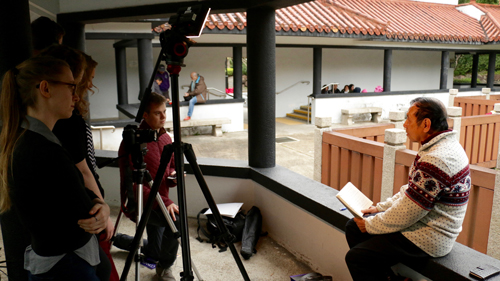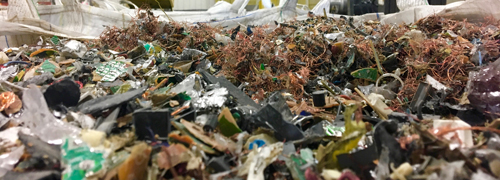Latest film from Extending the Link follows the trail of E-waste
April 17, 2017
By Elizabeth Flaherty '17

Extending the Link team members Marin Jaszewski (left) and Kevin Lynch (center, maroon shirt) conduct an interview in Hong Kong.

A pile of shredded E-Waste.

Three children on a hilltop looking down at the city of Hong Kong.
There are more cell phones than there are people on Earth.
What remains unknown, however, is the final resting place of these devices. For most consumers, out of sight and out of mind is the status quo.
These devices do not just disappear.
Over the last year, Extending the Link (ETL), a group of 20 students from the College of Saint Benedict and Saint John’s University, followed the trail of electronic waste from the streets of Minnesota to the city of Hong Kong to create a half-hour documentary showcasing this issue.
ETL will premiere its 10th documentary “Luen Hai: Decoding the Connection” at 7 p.m. Thursday, April 20, in the Stephen B. Humphrey Theater, SJU. Following the showing, there will be a panel discussion with members of the ETL team and individuals who are experts on electronic waste. This event is free and open to the public.
“Luen Hai” will also be shown at 7 p.m. Friday, April 28, in the Gorecki Family Theater, Benedicta Arts Center, CSB.
Electronic waste is a term used to describe electronic products that have become unwanted, non-working or obsolete, and have reached the end of their useful life. Over the course of the school year, ETL’s team interviewed over 30 individuals in the Midwest, Seattle and Hong Kong to gather research and human stories behind this topic.
Hong Kong is a dumping ground for many old electronic devices. This is a result of the skyrocketing electronic industry, the low cost of manual labor in the city and the lack of transparency in Hong Kong’s cargo shipping yards.
“Our idea with our film is that we are a vehicle for social change, so we are trying to inspire other people with our message and then go on and continue with it in their own way,” said Malia Carson, one of ETL’s co-leaders for this documentary. “Everyone can really learn from each other; everyone has their own story. They just need someone to tell it.”
With ETL’s act local initiatives, the club aims to create sustainable social change. This helps continue the discussion on these issues long after that year’s team graduates.
While the topic changes every year, ETL’s motto, “Think Globally, Act Locally” does not. ETL strives to create local initiatives in order to construct tangible, positive change in the local community inspired by that year’s film topic.
ETL will be collecting used, outdated or broken electronic devices after the April 20 showing at SJU with the help of Tech Dump, a Minneapolis electronics recycler. The group also hopes to have a fix-it clinic before the end of the school year in May.
ETL was created in 2007 by three students - Nate Ptacek, David Slifka and Andrea Carrow - on a semester abroad program in Guatemala. These students saw firsthand the importance – both socially and economically – of fair-trade coffee in their study abroad community.
Once home, the students became advocates of fair-trade coffee and began planning their return trip to Guatemala – this time with a passion and desire to spread the significance of fair-trade coffee back to their local community.
After renewing connections made in Guatemala, the students set out to produce hours of footage, dozens of local interviews and endless hours of research. By spring 2008, they had produced a 22-minute documentary titled “Somos de Café.”
Extending the Link was born.
Even today, both campuses serve fair-trade coffee because of the efforts of those first ETL members.
Ten years and nine documentaries later, ETL is focused on bringing the under-told social justice issue of electronic waste back to campus.
ETL hopes to continue to foster discussion on global issues through the creation of the annual documentaries. The documentaries are meant to ignite social change that empower students, faculty, alumnae/i and the greater community to work for improved social justice at home and abroad.
Editor’s note: Elizabeth Flaherty is a senior communication major from Maple Grove, Minnesota, and a student employee in the Office of Marketing and Communications. She is a videographer for the Extending the Link team.
